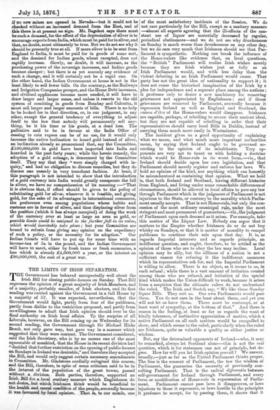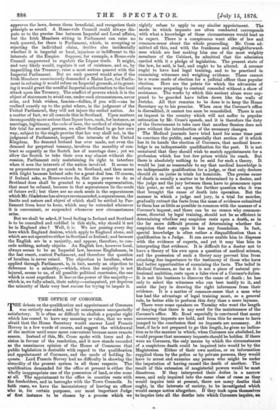ThE LIMITS OF IRISH SEPARATISM.
THE Government has behaved unexpectedly well about the Irish Bill for closing public-houses on Sunday. That Bill expresses the opinion of a great majority of Irish Members, and of a majority, probably smaller, of Irish electors, and its first reading was carried against the Government in a iull House by a majority of 57. It was expected, nevertheless, that the Government would fight, partly from fear of the publicans, partly from dislike to the restriction proposed, and partly from unwillingness to admit that Irish opinion should ever be the final authority on Irish local affairs. To the surprise of all Liberals, however, on the Bill coming up on Wednesday for its second reading, the Government through Sir Michael Hicks Beach not only gave way, but gave way in a manner which suggested that they were content. The Government considered, said the Irish Secretary, who is by no means one of the most squeezable of mankind, that the House in its recent division had "decided that further restriction on the opening of public-houses on Sundays in Ireland was desirable," and therefore they accepted the Bill, and would only suggest certain necessary amendments in Committee. Mr. Gladstone cordially eulogised this course, and the Bill, therefore, in spite of some criticism said to be in the interest of the population of the great towns, passed without a division. Both parties, therefore, supported an Irish Bill for a local sanitary measure which Englishmen do not desire, but which Irishmen think would be beneficial to the health and moral condition of the people,avowedly because it was favoured by local -opinion. That is, to our minds, one if no new mines are opened in Nevada—but it could not be ' of the most satisfactory incidents of the Session. We do not care particularly for the Bill, except as a sanitary measure —almost all experts agreeing that the ill-effects of the con- stant use of liquor are materially decreased by regular, periodical abstinences—and we do not see why drunkenness on Sunday is much worse than drunkenness on any other day, but we do care very much that Irishmen should see that Par- liament is sympathetic. Nothing can break the influence of the Home-rulers like evidence that, on local questions, the " British " Parliament will realise Irish wishes merely because they are Irish wishes just as fully as an Irish Parliament would, and with less delay than the violent debating in an Irish Parliament would cause. That party has not the great idea of nationality to support it ; it does not rouse the historical imagination of the Irish by a plea for independence and a separate place among the nations ; it professes only to desire a new machinery for removing grievances not appreciated by Englishmen ; and if those grievances are removed by Parliament, avowedly because it represents Ireland as well as England and Scotland, the raison d'etre of the Home-rulers would disappear. Irishmen are capable, perhaps, of rebelling to secure their ancient ideal, but they are not capable of rebelling in order that their representatives should carry local Bills in Dublin, instead of carrying them much more easily in Westminster.
The incident gives us a good opportunity of explaining what we mean, and what much more important authorities mean, by saying that Ireland ought to be governed ac- cording to the opinion of its inhabitants. Tory op- ponents are very apt to taunt us with holding a doctrine which would be Home-rule in its worst form,—viz., that Ireland should decide upon her own legislation, and that Parliament should merely register and enforce her laws. We hold no opinion of the kind, nor anything which can honestly be misunderstood as containing that opinion. What we hold is, that both Ireland and Scotland, having different histories from England, and living under some remarkable differences of circumstance, should be allowed in local affairs to pass any law through Parliament which in the judgment of Parliament is not injurious to the State, or contrary to the morality which Parlia- ment usually accepts. That is not Home-rule, but only the con- cession of the most ordinary municipal rule, under the most stringent and most permanent of guarantees,—viz., the judgment of Parliament upon each demand as it arises. For example, take this matter of the Liquor Law. Nobody can argue that it matters to the Empire whether Irishmen do or do not buy whisky on Sundays, or that it is matter of morality to compel publicans to continue their sale upon that day. It is, as regards Imperial interests and as regards principle, an indifferent question, and ought, therefore, to be settled as the opinion of those who are to obey the law may incline. Local opinion may be silly, but the silliness of a nation is not a sufficient reason for refusing it the indifferent measures which its representatives ask for, and the Imperial Parliament is willing to allow. There is no object, as it seems to us, in such refusal ; while there is a vast amount of irritation created among those who are refused, and irritation of the special kind which makes the Union difficult to work, because it arises from a suspicion that the ultimate rulers do not understand the ruled. The Irish and Scotch say, " We like these Sunday liquor Bills. They suit us. Our own Parliaments would pass them. You do not care in the least about them, and yet you will not, let us have them. There must be contempt, or at least want of sympathy, at the bottom of that." And there is reason in the feeling, at least so far as regards the want of kindly tolerance, of instinctive appreciation of motive, which a native Parliament on all such matters would be compelled to show, and which seems to the ruled, particularly when the ruled are I;ishmen, quite as valuable a quality as either justice or wisdom.
But, say the determined opponents of Ireland—who, it may be remarked, always let Scotland alone—this is not the real question, which is for statesmen one not of principle,, but de- gree. How far will you let Irish opinion prevail ? 'We answer, broadly,—just as far as the United Parliament thinks proper. The line is the consent of Parliament, the law the wisdom of Parliament, the guarantee the necessity of previondly con- sulting Parliament. That is the radical dijerentia between self-government for Ireland through Parliament, and every form or modification of Home-rule in supersession of Parlia- ment. Parliament cannot pass laws it disapproves, or laws injurious to those it represents, or laws hostile to the principles it professes to accept, for by passing them, it shows that it approves the laws, deems them beneficial, and recognises their principle as sound. A Home-rule Council could always dis- pute as to the precise line between Imperial and Local affairs, but the Irish Members sitting in Parliament can raise no such quarrel, for there is Parliament, which, in accepting or rejecting the individual claim, decides also incidentally whether it is imperial or local, injurious or indifferent to the interests of the Empire. Suppose, for example, a Home-rule Council empowered to regulate the Liquor trade. It might, and very likely would, regulate it out of existence, and so, by imperilling the Treasury, raise a most serious quarrel with the Imperial Parliament. But no such quarrel would arise if the Irish Members unanimously demanded a Maine Law, for Parlia- ment in refusing it would refuse on Imperial grounds, orin grant- ing it would grant the needful Imperial authorisation to the local attack upon the Treasury. The conflict of powers which it is the object of statesmen to avoid can, under such circumstances, never arise, and Irish wishes, fancies—follies, if you will—can be realised exactly up to the point where, in the judgment of the United Parliament, they will not injure the united nation. As a matter of fact, we all concede this in Scotland. Upon matters incomparably more serious than liquor laws, such, for instance, as marriage, legitimacy, the code of laws, the method of obtaining a fair trial for accused persons, we allow Scotland to go her own way, subject to the single proviso that her way shall not, in the judgment of Parliament, imperil the interests of the United Kingdom. N o demand Ireland has ever made, not even the demand for perpetual tenancy, involves the morality of con- tract so urgently as the Scotch law of marriage does ; yet we allow the Scotch to take their own way almost without dis- cussion, Parliament only maintaining its right to interfere when it sees the interests of the nation involved. It seems to ns preposterous to grant so much to Scotland, and then moan with fright because Ireland asks for a great deal less. Of course, if Ireland asks, as Home-rulers do, that the power to do as Scotland does shall be granted to a separate representation, that must be refused, because in that separateness lie the seeds of future evil; but there are no such seeds in the separateness which Mr. Gladstone has always recommended, a separateness, the limits and nature and object of which shall be settled by Par- liament from hour to hour, which may be extended whenever it is convenient, or suspended whenever new circumstances arise.
But we shall be asked, if local feeling in Ireland and Scotland is to be consulted and coddled in this style, why should it not be in England also ? .Well, it is. We are passing every day laws which England desires, which apply to England alone, and which are not operative either in Scotland or Ireland ; and because the English are in a majority, and appear, therefore, to con- cede nothing, nobody objects. An English law, however local, always seems to be an Imperial law, because Englishmen, in the last resort, control Parliament, and therefore the question of localism is never raised. The objection to localism, when applied through Parliament, is, in fact, merely an objection to deference to a minority,—which, when the majority is not injured, seems to us, of all possible political courtesies, the one which is most expedient. It leaves the power of the majority— which is, we fully admit, their safety—unimpaired, yet deprives the minority of their very best excuse for trying to impair it.































 Previous page
Previous page